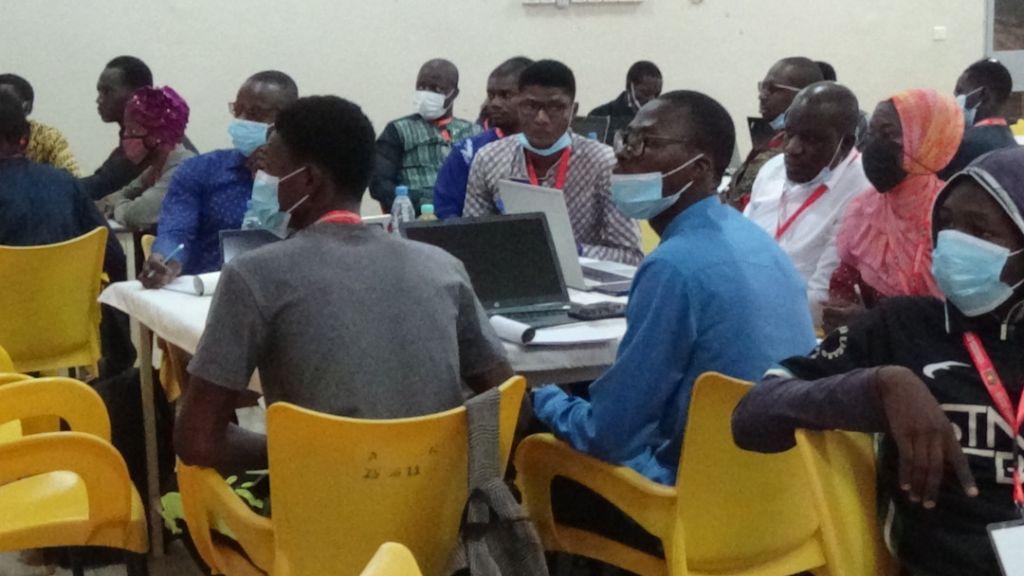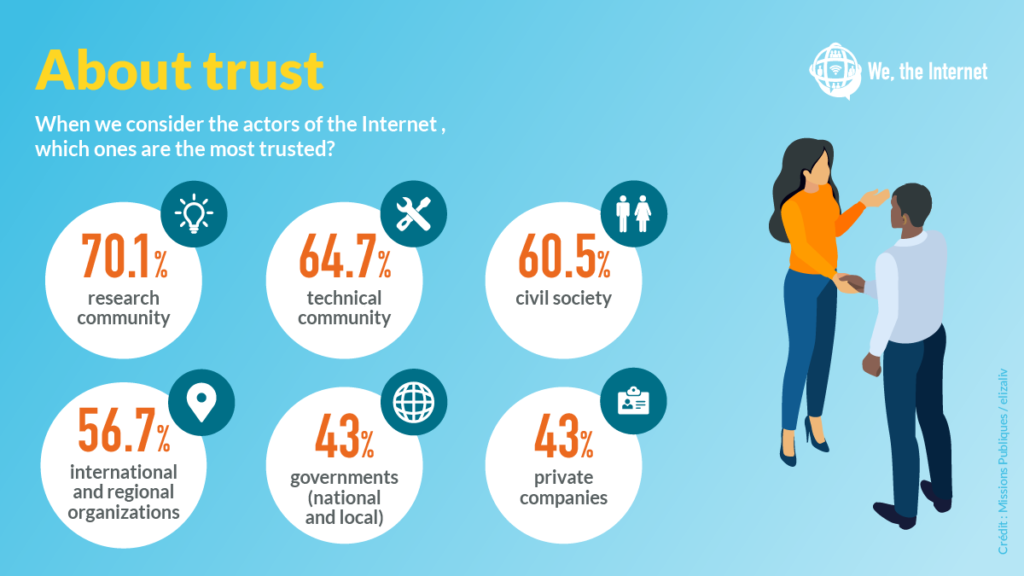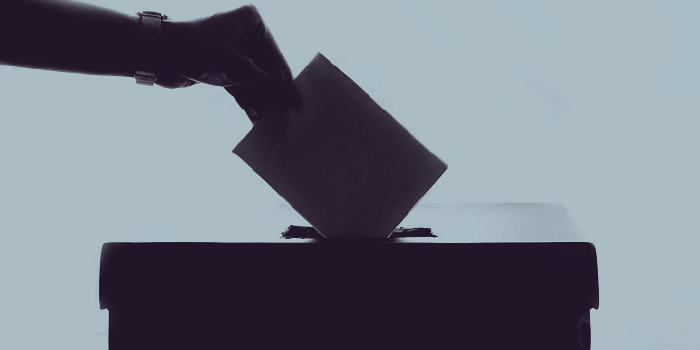'We, the Internet', a new model for Internet governance

Internet is everywhere, but have you ever wondered how it works? Who oversees it? And what could be changed about it to make it a better space?
The ‘We, the Internet’ project
Internet is everywhere: between our fingers, in our homes, in our relationships. No doubts about that. It is sometimes perceived as a threat, sometimes as a gift, some people hate it, others can’t live without it. But have you ever wondered how it works? Who oversees this big yet undefined network called the “Internet”? And, most importantly, what could be changed about it to make it a better space?
Tackling these questions is the ambition of ‘We, the Internet’. Initiated by Missions Publiques, an agency specialised in citizen participation for decision making processes, the project aims at bringing citizens and stakeholders into policy and in the end, making better and smarter decisions that affect us all.
Internet has this particularity that it is not subject to any centralised governance and there is still blur in who is doing what, between states, companies and international organisations. It was high time to push for a new model of governance that is not used nor experienced in the current areas of power: a participative and a deliberative one, adding one layer of the society that is often left aside - citizens.
Unlike a simple poll where people are asked to tick a few boxes, this deliberative and participative process brought together ordinary citizens from various scopes of life who were asked to discuss and argue about a specific topic after being informed about it.
A common initiative
Started in 2017, the ‘We, the Internet’ model was discussed with top-level actors from the internet galaxy, among whom is Vint Cerf, Vice-President of Google and Inventor of the Internet. Together, companies (Facebook/Meta-Google,…), public authorities (European Commission, German government, United Nations) and non-governmental organisations (World Wide Web Foundation, Internet Society,…) (the complete list of partners can be found here) imagined and designed this new paradigm with Missions Publiques.
To maximise impact, the choice was made to couple a global Citizens’ Dialogue with a Stakeholders’ Dialogue, gathering 300 stakeholders from more than 80 countries. The outputs of these discussions were integrated by the German government (Ministry of Federal Foreign Affairs), which was the main institutional partner of the project and also one of the three co-champions in charge of delivering an options paper on the Future of Internet Governance to the UN. The results also fed into the process of the Roadmap on Digital Cooperation issued by the UN Secretary General’s Office.
A global Citizens’ dialogue to discuss the future of the Internet

For the Citizen’s Dialogue, 70 partners in 70 countries were trained and supported on the methodology and on the content of the dialogue to implement them locally (Burkina Faso in the picture above - credits: Missions Publiques, 2020).
During one day, 5,500 global citizens representing the diversity of the population in their country (on the basis of gender, age, education and access to internet) discussed what they want for the future of Internet through 4 topics: data protection, disinformation and fake news, digital identity and artificial intelligence.
The same process was implemented to all countries, providing comparative data and a global population response. In some countries, citizens had the opportunity to tackle an additional topic relevant with their the national context (e.g. in Brazil, citizens discussed disinformation in election times; in Nigeria, citizens discussed gender in the technology sector).
What did the citizens say?
Five key visions emerge out of the Citizens’ Dialogue. These visions are the product of a process of information, discussion, and choice. The results reflect what the general public will think in a couple of years from now. There are no particularly striking differences between countries in the results. Citizens from the north and the South, the East, and the West have a very converging vision.
-
Citizens of the world are far from having a naive or catastrophic view of digitalisation. They acknowledge that the Internet is now an essential part of their lives. They are aware of its multidimensionality and see both its great potential for progress and freedom, and the threats it bears, making the digital sphere an unsafe place. A majority trusts the Internet and the applications running on it. COVID-19 has massively changed how they use the tool and has made the Internet more relevant for them than ever.
-
Citizens of the world consider that a data-driven society could unlock a positive future for all if four core conditions are met: (a) data should be handled as a personal reflection online and hence be tied to Human rights; (b) there needs to be a straightforward way of trusting the data; (c) citizens want to be able to control and access the data; (d) data governance should be science-based and multistakeholder.
-
Citizens of the world call for a Digital Public Sphere that is inclusive, protects the free exchange of views, and is based on respectful interactions. To fight against disinformation, they consider that a shared action and governance is needed. They rank education as the most effective and urgent tool in the fight, followed by human-based interventions allowing to secure the quality of content. Legal instruments to regulate Information online come third. Self commitments by stakeholders have the least support.
-
Citizens of the world consider that their level of knowledge and understanding of AI is not high enough to have an informed discussion on it. They think that other stakeholders, like companies and governments, face the same limitation. Nevertheless, they articulate the wish to pursue this discussion as it seems crucial to them. They are clear on two priorities: AI should be used for the common good. Its governance should be carefully designed to forget no one.
-
Citizens of the world have firm hopes and fears regarding the future of the Internet. They want the Internet in 2040 to be more democratic, inclusive and accessible, and for digital developments to serve the well-being of humanity. They want to prevent the Internet from taking so much space that it causes health problems, huge unemployment rate, environmental issues, loss of social interactions, online abuses, cyberattacks… To reach this desirable future and avoid ending up with what participants fear the most, a strong governance system of the Internet is key. Citizens are strongly supporting a multistakeholder and global approach as the way to go for the Internet and its governance.

Moving the lines
The results and recommendations that came out from these processes were presented at the Internet Governance Forum (IGF) of 2020 and 2021. The ‘We, the Internet’ global project had opened the Pandora box for citizen’s expression in the decision-making process of Internet governance. Ordinary citizens, who use the Internet on a daily basis can bring added value to the discussions, wherever they come from and whoever they are.
Since the 2020 dialogues, Facebook/Meta has created a new department for citizen’s dialogues to be launched in the metaverse, the IGF multistakeholders advisory group (IGF-MAG) has put this trend on their new agenda, the three European institutions have launched the Conference on the Future of Europe with citizen’s panels, one of which dealt with digitalisation. The next step? A global citizens’ dialogue on the forthcoming UN Global Digital Compact launched by Antonio Guterres, Secretary General of the United Nations.
Trust the citizens!
Over the years, the Internet has become a mirror of how the society evolve. Citizens must be involved in the management of the city or town or country in which they live, the same applies for Internet governance: citizens should also be involved in the decisions that affect them.
No subject is too complex or too divisive to be discussed with citizens and stakeholders. Making it possible to express and listen to divergent perspectives is the basis for dialogue and improved decision-making.
DecodeTech publishes opinions from a wide range of perspectives in hopes of promoting constructive debate about important topics.
Recommended citations:
- https://missionspubliques.org/what-citizens-think-about-the-internet-and-its-future/?lang=en
- https://missionspubliques.org/the-voice-of-the-unconnected-is-just-as-valuable-as-the-voice-of-the-connected/?lang=en
- https://missionspubliques.org/the-internet-is-essential-for-the-survival-of-the-wayuu-indigenous-community/?lang=en
- https://missionspubliques.org/my-call-is-to-join-forces-to-co-create-a-global-digital-compact/?lang=en
More info about the project can be found on the blog of Missions Publiques and on the website of the ‘We, the Internet’ project. The full report of results can be found here and in video here.


